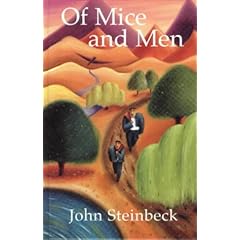 --The blurb--
--The blurb--"“Guys like us, that work on ranches, are the loneliest guys in the world. They got no family. They don’t belong no place ...With us it ain’t like that.We got a future ... because I got you to look after me and you got me to look after you.”
George and Lennie are migrant American labourers –the one alert and protective and the other strong, stupid and potentially dangerous. This is the powerful story of their relationship and their dreams of finding a more stable and less lonely way of life."
--The review--
It is arguably the job of an author to bring to life a world that is previously unknown to their readers, and yet the scene that opens Of Mice and Men is perhaps more universal than this: the paradisiacal setting of American countryside is awash with rich colour and is almost synaesthetic in its ability to make words morph into textures and sounds and breaths of sunny breeze. Steinbeck then goes on, however, to narrow down the experience and fuse the pan-global landscape with the more specific toils and backgrounds of the two main characters.
Starting off very slowly and languorously, Steinbeck allows the reader to savour every word and moment before taking them on a rollercoaster of increasingly serious events whereby George and Lennie are under ever-more serious threats to their jobs, dreams and lives. Steinbeck successfully manages to provoke pathos in the reader towards each of these characters, though for very different reasons, and keeps the plot incredibly tight and concise, which is perhaps the main contributor to its success.
The novel's ending is both finished and unfinished, leaving the reader stunned and with many unanswered questions about the nature of friendship. Is the previously paradisiacal arena now just a personal hell? And does George's final action make him the greatest of enemies or the greatest of friends? In addition to this, the novella raises the issue throughout of how mental illness is, was and should be treated, and it is perhaps Steinbeck's treatment of these timeless themes that reveals the key to the enduring success of his work. It perhaps proves that an author's job is therefore not entirely to bring a different world to their readers, but rather to combine it with themes that are familiar across humanity in order to create a truly great story that echoes down the ages.
Other works by John Steinbeck (selection)
Cup of Gold (1927)
The Red Pony (1933)
Tortilla Flat (1935)
The Grapes of Wrath (1939)
The Pearl (1947)
East of Eden (1952)





No comments:
Post a Comment